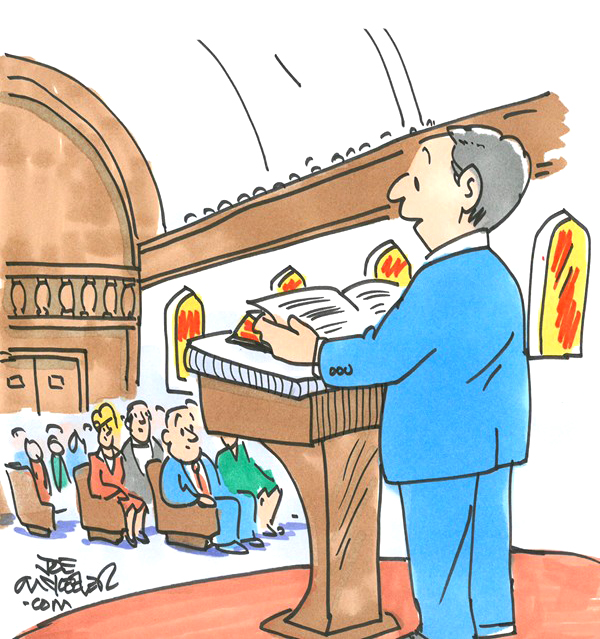
 ELGIN, Ill. (BP) – No matter what you believe, what you think, how you vote, or how you live your life, someone is going to disagree with you. Even in church, disagreement is inevitable, especially in this political season. But how do we handle it?
ELGIN, Ill. (BP) – No matter what you believe, what you think, how you vote, or how you live your life, someone is going to disagree with you. Even in church, disagreement is inevitable, especially in this political season. But how do we handle it?
From the Book of Proverbs, I find 13 or so passages about disagreeing wisely. And from those verses, I see six principles to help guide political discussions. They’re not for posting on Facebook for all who disagree with me to see. These verses are for me. (And maybe you.)
- Disagree only after listening, hearing and seeking to understand (Proverbs 12:15; 18:2, 13).
These verses are a gut punch to me. Reading them, I realized just how often I “think my own way is right,” just how often I “have no interest in understanding and only want to air my opinion,” and just how often I “give an answer” before I really stop to hear the other person.
I have several close friends who have helped me realize this very practically in my life. I have political disagreements with one and theological disagreements with another. Both are patient enough with a hothead like me to calmly explain their stances. And I am very grateful for both of these friendships because they have helped me begin to grow in wisdom.
- Disagree with patience, calmness and gentleness (Proverbs 12:16; 15:1).
Fools get into arguments with people due to quick tempers and harshness. Even when people speak in anger, the wise person doesn’t return the favor. Wisdom responds to disagreement by being slow-tempered, by staying calm when insulted, by refusing to retaliate.
This may be hard to do, but the only way to end escalating insults is for one person to respond with a gentle answer. Proverbs says a gentle answer will deflect the anger. Bullying rarely leads to unity.
- Disagreeing wisely can be persuasive or beneficial (Proverbs 15:2; 16:21-24; 18:20).
Solomon calls an attack of insults “belching out foolishness.” By contrast, wise words “satisfy like a good meal” and “bring satisfaction.” Healthy, wise, godly disagreement is defined by pleasant words, kindness, wisdom, and self-control. Pleasant words are persuasive. And even if we don’t persuade the other person, our demeanor makes all the difference. The other person can walk away saying, “Well, I sure disagree with them, but at least that Christian listened to me.”
- Only disagree if you can preserve relationship (Proverbs 17:9; 18:19).
Have you hit “block” or “hide” on Facebook for someone who annoyed you with their political posts? You may think their political ideology is crazy, unethical or even unbiblical, but relationships with the people around us are always more important than our opinions of their opinions.
Proverbs warns that “an offended friend is harder to win back than a fortified city.” Ideally, we never let relationships get ruined by disagreement in the first place. But when we cross a line or someone crosses a line against us, the wise thing to do is to forgive and pursue reconciliation.
People will have different opinions – even in church– and that’s OK. But we can’t let disagreement “separate close friends.”
- Only disagree if you know when to stop (Proverbs 20:3, 9).
This is a big one. One of my favorite quotes is “Never argue with a fool. They drag you down to their level and then beat you with experience.” It’s a sort of silly quote that really echoes the truth of Proverbs: “Don’t waste your breath on fools.”
The problem today is that people don’t know where to draw the line. Some fights aren’t worth having. It is not wise when we argue about something that neither person will ever change their minds on. Don’t even start disagreeing with someone if you don’t have it in you to stop. Because if that happens, you’re probably falling into a spiritual trap that is dangerous to you personally.
- Don’t spend time with disagreers or become one yourself (Proverbs 22:24-25).
Some might read this proverb as hyperbole, but I think that would be a mistake. There’s a very real, destructive threat to our lives by associating with disagreers. “You will learn to be like them and endanger your soul.” Sadly, non-Christians already tend to see Christians as argumentative because we believe in absolutes.
What’s at stake if we become argumentative? Joy and happiness in this life are at stake. Healthy relationships are at stake. Evangelism and effective witness are at stake. Jesus didn’t lay down His life on the cross so that we could argue our way through life. We are not called to shove our opinions about politics and everything else on other people. Instead, to live wisely, even when we disagree, is to live like Christ.
If that hasn’t been proved before the election, it surely will afterward.
Noah Adams is pastor of Calvary Baptist Church in Elgin, Ill.





















